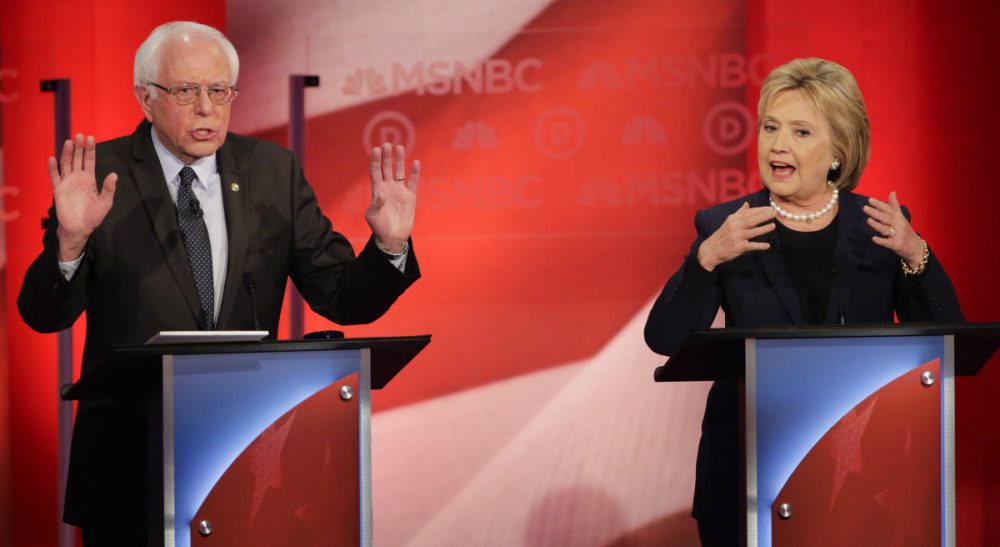Advertisement
Primary Colors: Hillary, Bernie And The Fight Between Realism And Idealism

Hillary Clinton spent the first part of Thursday's debate trying to redefine the word "progressive." The heated exchange with her opponent, Bernie Sanders, underscored what she clearly now knows — Sanders could win the Democratic nomination. And it is possible not because of his command of vocabulary, but because his aspiration trumps her pragmatism. This was on display on that Durham, NH stage as well. Clinton effectively criticized Sanders for wanting to do too much, for creating unrealistic hopes, for not "leveling" with people about how unlikely some of what he seeks to do really is. In many ways, the tension between her realism and his idealism defines this race.
Secretary Clinton's campaign is premised on experience (the most qualified candidate ever), while Senator Sanders’s campaign is all about authenticity (he has been fighting the same fight since he was a teenager), and hope (health care for all, tuition-free public college, the rebirth of the middle class). Clinton is still searching for a solid counter-narrative. Asked at a CNN town hall on Wednesday to help a woman explain to her daughters why they should stop "feeling the Bern," Clinton spouted off a long summary of her professional accomplishments. It was a tone-deaf answer — younger voters respond to optimism and possibility, not résumés.
Secretary Clinton's campaign is premised on experience ... while Senator Sanders’s campaign is all about authenticity...
There are two popular arguments against Sanders. First, many claim he is unelectable. This is why I am not persuaded: As the senator suggested in Thursday’s debate, Democrats win large turnout elections. Sanders’s campaign has inspired many people to participate in politics for the first time; a curmudgeonly 74-year-old has tapped into the heartbeat of many disenfranchised people. He is preaching FDR-era Democratic values to a whole new generation. And they are listening. In order to win the nomination, he would have to build a national voter base that would make him electable.
In contrast, Secretary Clinton's campaign depends on a core constituency that is decades in the making. But she is not expanding her base; she, by her own admission, is not inspiring younger voters. During Wednesday’s Town Hall, she worked hard to explain the degree to which she is the target of a "vast right wing conspiracy," why she took $675,000 for a speech from Goldman Sachs ("it's what they offered") and her vote on the Iraq War (the Bush administration betrayed her). At the debate, she said she'd have to "look into" releasing the transcripts of her paid speeches, which she said were very much just part of how things work (other former officials are on the "speaking circuit"). Moments like this explain why, as a general election candidate, she is an uninspiring choice — exactly the kind of candidate who will not motivate turnout and who might, therefore, lose.
The second prevailing concern about Sanders is that his policy agenda is too ambitious. He readily concedes this point — it's at the core of his call for a "political revolution." And this is the hook on which the Clinton campaign hangs its "progressive who gets things done" label. Stepping back from the fray surrounding the word progressive and the notion of revolution, I wonder why on earth anyone thinks it would be a bad thing to have a president whose policy ambitions push Congress farther than it will currently go. The system of divided power in the Constitution comfortably anticipates and embraces this circumstance. Bernie would use the "bully pulpit" of the office to push for change. If elected, he would (by definition) have a mandate; the necessary result of the inherent implausibility of his victory.
This difference reflects the candidates' essence. For a long time, Clinton has been who she thinks she has to be to succeed. Forever, Sanders has been exactly who he is today.
Neither a President Clinton nor a President Sanders would have a cooperative legislature. As a consequence, neither one of them will accomplish their entire agenda. Clinton says that this should shape what we seek; Sanders is unwilling to compromise. She says we should aim for less, because that is what the world will allow. Sanders wants to aim for more, and then change the world to make it happen. This difference reflects the candidates' essence. For a long time, Clinton has been who she thinks she has to be to succeed. Forever, Sanders has been exactly who he is today. That kind of clear-headed authenticity is the definition of presidential — and the reason that the argument about seeking to do too much is foolhardy.
Bernie Sanders is calling for the kind of urgent change that is the essential promise of politics. In response, the collective voices of the experienced (politicians, pundits and others), say that it's too much and that it can't be. This has never been the call of the Democratic Party. Indeed, it is the very opposite of hope. For voters frustrated with or on the outside of politics, Hillary Clinton's realism amounts to a concession that we cannot have the kind of vigorous democracy that many of us consider our birthright as Americans. In response, Bernie Sanders's loud call to arms affirms the promise of our democracy — if we all stand up, he says, we can have the country we want and the change we need. That sounds right to me.
